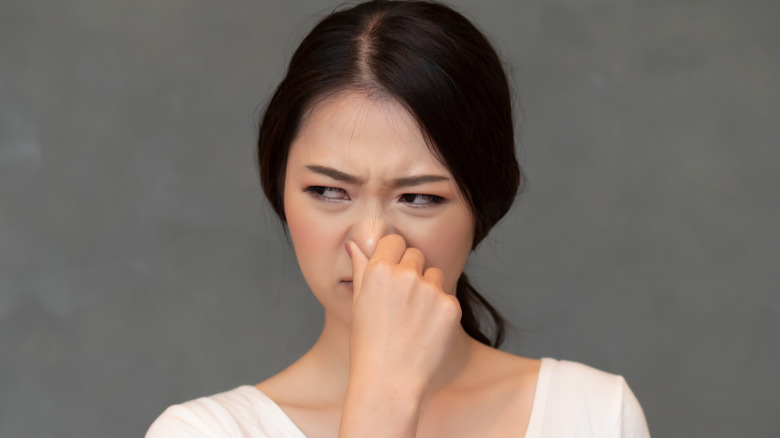Can Taking Ozempic Cause Smelly Burps?
Ozempic has worked miracles for many diabetics to control their blood sugar and A1C, and some people have seen success using this semaglutide drug to control their weight. Ozempic works like other glucagon-like peptide-1 (GLP-1 agonists) by triggering your cells to release the GLP-1 hormone. This not only stimulates insulin and blocks the production of glucose, but it also slows down your digestion. GLP-1 also signals to your brain that you're full (via GoodRx).
According to Drugs.com, those taking Ozempic commonly experience side effects such as nausea, diarrhea, vomiting, and constipation. In less than 10% of people who take Ozempic, one side effect might taste and smell nasty: a sulfur burp. One Ozempic user told The Atlantic that the burps "taste and smell like rotten eggs." Nice.
In Ozempic's clinical trials, less than 3% of people experienced "eructation," which is a fancy name for burping. The smelly burp might begin when you first start taking the drug or if you've just increased your dose. Weight management specialists tell The Atlantic that the issue typically goes away after a few months.
What causes a smelly burp?
When you eat a meal, air builds up during the digestive process. If the digestive system is slowed down, as happens while taking Ozempic, more air builds up in your digestive tract. That air can't stay there forever and escapes up as a burp or travels down the intestinal tract as flatulence (via Medical News Today).
Although Ozempic might cause you to burp, the rotten egg smell from sulfur burps can also be caused by stress, acid reflux, and certain bacterial infections, according to Metropolitan Gastroenterology Associates. Foods like broccoli, dairy, and beer can also contribute to sulfur-tasting burps.
Weight management experts are noticing that the smelly burps from their Ozempic patients are often triggered by large meals and dairy. They're telling patients to avoid eating heavy meals or eating close to bedtime (via The Atlantic). Medical News Today suggests an over-the-counter anti-gas medication with simethicone (Gas-X) to relieve symptoms. It also helps to eat foods slowly to avoid gas. Additionally, Metropolitan Gastroenterology Associates suggests home remedies such as drinking green, peppermint, or chamomile tea. Manuka honey might also protect your gut and relieve the gas.


